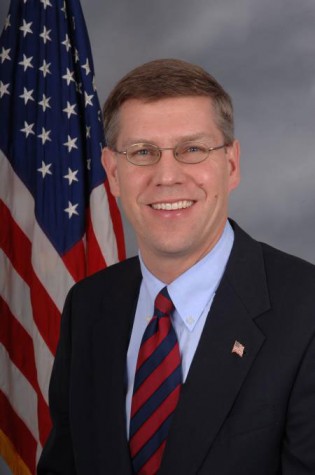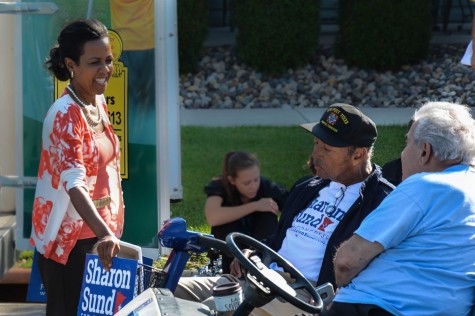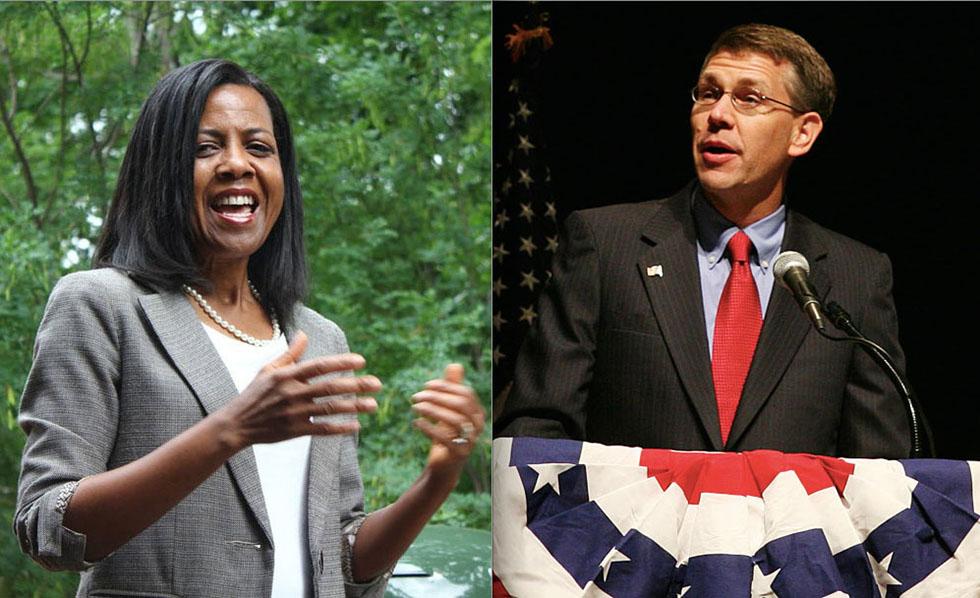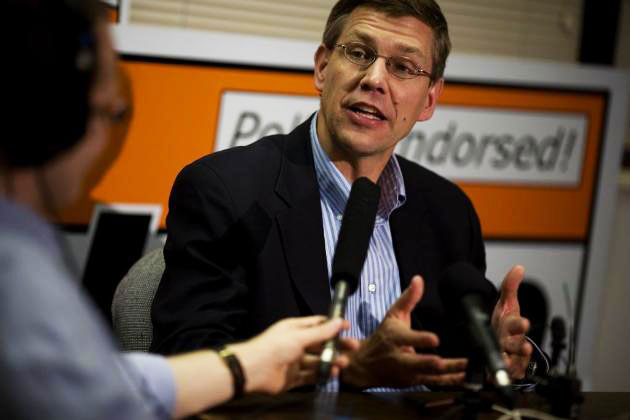Congressional District 3 under the spotlight: Sund vs. Paulsen
Congressional District 3, which includes Plymouth, Brooklyn Park, Eden Prairie, and Edina, is looking to elect a representative for the United States House of Representatives. Will it be Sharon Sund, the political outsider, mom, and scientist? Or Erik Paulsen, six-term congressman, father, and small business owner? It's up to you to decide.
October 13, 2014
Courtesy of Friends of Erik Paulsen
Erik Paulsen, at age 49 is one of the youngest members of Congress.
Paulsen seeks a fourth term in the third congressional district
I am a typical high school student who sits on my couch, while half-mindedly doing Spanish homework, with the TV droning in the background.
“Mike McFadden doesn’t care about Minnesota. His interests are only with big corporations,” I hear blaring. As I’m about to dismiss it as another stupid political ad, I realize something, I’ll be able to vote in this election, and I know nothing.
After recalling a plethora of lawn signs around my neighborhood and a quick google search, I deduced that my representative in Washington D.C. is Rep. Erik Paulsen (R) from Congressional District 3, but I was completely clueless as to his views until I began research for this story.
Having served three terms in the US House of Representatives after being elected in 2008, Paulsen, who is up for reelection, states that he is dedicated to “bringing bipartisan solutions, and results-driven leadership to Washington,” Paulsen said.
A 1987 graduate of St. Olaf College in Northfield, Minnesota, Paulsen majored in Mathematics, setting him apart from many other Representatives in Washington. Paulsen also sets himself apart with his time in the private sector, working as an analyst for Target.
“It’s really important for elected politicians to have real world experience. [Most politicians] do not know what it means to run a business or sign a paycheck,” Paulsen said. “It’s healthy to have a balance of folks from different walks of life. I’ve got an appreciation for what these policies that are proposed actually mean, whether it’s going to help or hurt the economy.”
Beginning his political career early, Paulsen worked as an intern for Republican Senator Rudy Boschwitz in 1989 and worked closely with Representative Ramstad as a staffer until he ran for the Minnesota House of Representatives himself in 1994. “I wanted to become involved in politics because I saw the opportunity to create change and make things happen. I wanted to make a difference.” Paulsen said.
First elected following the retirement of Rep. Jim Ramstad, whom Paulsen worked for as a staffer in the early 90’s. Paulsen served in the Minnesota House of Representatives from 2003-2007. “I noticed that there are a lot of big issues on our country’s horizon, and I wanted to make a difference. I wanted to make sure that my daughters have the same opportunities that I did,” Paulsen said.
One of Paulsen’s goals throughout his political career has been to break down partisan gridlock and inefficiency, and institute a results-oriented approach to policymaking. He has worked numerous times in the past on bipartisan bills, most notably, the Safe Harbors Bill, working to stop sex-trafficking in Minnesota, and the repeal of the medical device tax.
“I’m proud of being able to get things done in a politically charged environment: passing the sex trafficking bill and the repeal of the medical device tax that was harmful to Minnesota,” Paulsen said. “Being able to bridge both sides of the aisle so you can actually get some things done. Being results-oriented is the thing I’m most proud of and hope others will be the same.”
The bipartisan work done in Washington by Paulsen has not gone unnoticed. Paulsen’s biggest supporters continue to support him as a result of the work he’s been able to accomplish. “Most of Washington spends too much time voting along party lines––[Paulsen] isn’t afraid to go against that. He is a practical politician in a radical time dedicated to making things happen,” long time supporter and contributor of Paulsen, Tom Stauber said.
As an advocate for health care reform, Paulsen firmly believes in working to make healthcare more accessible for all Americans. Paulsen not only voted against the Affordable Care Act, more commonly known as “Obamacare,” in 2012, but supported the House’s decision to sue President Obama over the issue.
“[The Affordable Care Act] did not address one of the fundamental problems of healthcare which is the rising cost. The premiums continue to go up for individuals families and small businesses. Promises that were made about $2500, lowering your premium, being able to keep your doctor were all fiction. Unfortunately that’s hurt a lot of people,” Paulsen said.
Paulsen has pledged to solve the issues with the current system related to competition, and lower costs through prevention instead of cutting benefits. “The answer is that is has to be more patient-centered and consumer-oriented so that we’re addressing the cost side of the equation,” Paulsen said. “We need to implement more malpractice reform, competition between companies and make it more transparent.”
Another issue Paulsen has given close attention to is fiscal responsibility. With the national debt continually rising, citizens are demanding budget reform and control in Washington.
“Too many in Washington that think the budget deficit doesn’t matter. We’ve doubled the national debt in five years, and we’re set to triple it in ten,” Paulsen said. “[This] essentially means that [young people] are going to owe and pay back that money to countries like China. It’s not smart, and certainly it’s not putting us in a good position to compete with the rest of the world.”
With regard to solving the budget deficit, Paulsen plans to prioritize spending instead of completely cutting programs. “We need to stop set programs and not allow programs to get an automatic increase every year. They should have to come back and show what they’ve accomplished before being renewed,” Paulsen said.
According to Paulsen, growing and more complex taxes and regulations continue to harm the small business climate in America, and therefore he is committed to changing the tax code and improving the economy.
“Small businesses are the engine of the economy. We should be doing all we can to ensure they continue to grow because they are two thirds of our economy,” Paulsen said. “We need to do this through regulation and taxation. The tax code needs to be reformed to be fairer and simpler; there are too many special interest loopholes. The tax code should be designed to promote innovation and hard work and achievement.”
Paulsen has been an outspoken advocate for small businesses, working to try and create a productive environment for businesses to grow and prosper. “Small businesses are important to have growth because they’re the largest source of employment in the country. When the taxes on them are heavy it hurts the trickle down that could be possible through growth and development,” Stauber, small business owner, said.
The growing importance of social issues in the past have been detrimental to the historically socially conservative Republican Party, especially among youth voters. The Republican Party’s stance on issues such gay rights and voter registration have hurt their appeal to young people. “Social issues become very divisive because they’re such personal issues,” Paulsen said. “I try and focus my work on issues that will impact all of my constituents like helping small business and creating a better economy.”
Paulsen is targeting younger voters, looking to get them involved in his campaign. “I have always been focused on having younger people participate in the electoral and campaign processes,” Paulsen said. “I’m trying to lead the way in the Republican Party to secure the younger voters and help our party grow.”
Paulsen, 49, is one of the youngest leaders in Washington and is looking to pave the way for a more moderate brand of conservative politics. “I’m one of the younger members in the House of Representatives, and I think the House needs new energy and youngblood and I bring that,” Paulsen said. “Everyone thought my young age was going to be a liability, and it ended up being an asset.”

Championing the rights of small businesses, Erik Paulsen hopes to continue to help the private sector.
Running against DFL candidate and scientist Sharon Sund in 2014 will force Paulsen to address his views on climate change and other social issues. Paulsen and other Republicans have been fairly quiet in regard to the issue in the past, and instead, promote views and ideas to improve both the environment and the economy simultaneously. “What’s important is to find policies that conserve the environment and appropriate environmental stewardship,” Paulsen said. “Washington has gone to [entirely] in the other direction which is proposing policies that would further ruin the economy.”
Paulsen plans to introduce new policies that would further the development and implementation of new technology to better the environment. “I’m a big supporter of nuclear energy––energy is one of the largest components of our carbon footprint,” Paulsen said. “I’m also one of the only members of my party to support governmental research to develop renewable technology like solar energy.”
The passing of the Safe Harbor Bill in Minnesota, another issue Paulsen championed, was a breakthrough in sex trafficking legislation. Paulsen was an author of the bill and has passed a similar bill through the US House. “I authored the safe harbor bill and passed it in the house with overwhelming bipartisan support and new we need the senate to act,” Paulsen said. “These are bills that save lives so I have made it an ongoing mission of mine to replicate the successes that have happened in Minnesota.”
Paulsen feels a strong personal and local connection to the issue, which has inspired him to continue his work. “It is important to treat these people as victims not as criminals,” Paulsen said. “There’s no doubt that Minnesota has led the way in sex trafficking legislation; it’s an especially personal issue because of my own daughters and how close to home it is. People don’t realize it’s not only in foreign countries; it happens at the Mall of America and Eden Prairie mall.”
As campaign season continues to thrive, Paulsen is looking to serve his district again in the best way possible. His district had demanded results, and Paulsen has made it his goal to fulfill their wishes.
“I think my constituents represent a good district, and they expect results-oriented leadership, and that’s the approach I’m taking in Congress and working to get things done in a bipartisan manner on issues that are important to them,” Paulsen said.
After countless hours of research and interviewing, I have learned just about everything about Rep. Erik Paulsen. But more importantly, I’ve learned the importance of politics and the influence it has on my life. I no longer dismiss the attack ads or lawn signs, but instead pay attention and understand how–through politics–I could have an impact on my own situation.
Courtesy of Sharon Sund for Congress
Sharon Sund actively campaigns in the third district.
Sharon Sund seeks the third congressional district for the first time
On the north side of 394, less than a mile from Ridgedale Mall, sits a small office and a woman inside working diligently to become the next representative of Minnesota’s Congressional District 3. Sharon Sund––the Democratic challenger to incumbent Erik Paulsen––launched her campaign for the office in the spring of this year, looking to take back a seat held by Rep. Paulsen since 2008.
Relatively new to the political scene, Sund is not a politician in the typical sense of the word, but brings a unique set of attributes not often found in a congressperson.
Growing up in a military family, Sund didn’t grow up in a traditional household. “We moved to Germany for about for years, and my last five years I lived in Memphis,” Sund said, “my last five years I went to high school in Memphis.”
Due in part to the seemingly constant moving as a military family, the Sunds became a very close family unit, instilling strong values in Sharon and her siblings. “We got to meet a lot of wonderful people and visit some great places as a result of my father’s career,” Sund said. “This also instilled in me a commitment to family and also to service and country.”
Around the time Sund was growing up, the world––especially the United States––was going through massive social changes. “I was in Germany, in either the first or second grade, when Kennedy was assassinated, and I was in the fourth or fifth grade, living in Florida, when Martin Luther King Jr. was assassinated,” Sund said.
The death of these two civil rights advocates within such a short span of time sparked many strong emotions. “It seemed the riots were going on for months,” Sund said, “the anger, and explosions of pain, anger, and frustration were very frightening, especially to be growing up in.”
Beyond racial tensions in society as a whole, Sund also experienced first hand the pain of racism throughout her childhood. Attending both all white schools, and all black schools, Sund has a unique perspective of the time. “When I was in Memphis I went to an all black school, but when we moved to Biloxi Mississippi, where my father was stationed, I went to an all white school,” Sund said. “We were the first African-Americans in that school ever.”
“It was more different for me to be in an all black school than in an all white school, because I went to military schools for the majority of my life, and military schools were predominantly white schools,” Sund said, “and I wasn’t uncomfortable with that––I felt respected by the kids at school.”
However, not all of Sund’s experiences in segregated schools were positive. “I saw the beauty in both of those situations [all white and all black schools], and also the difficulty and pain in both of those,” Sund said. “I don’t remember getting invited to any birthday parties, or anything like that.”
Fascinated in the fields of science and math, Sund was eager to attend college in order to become a scientist. “I moved up here [Minnesota] to become a scientist, and I went to Macalester,” Sund said.

Sharon Sund wants to build an economy that works for everyone.
Following graduation, Sund began working at the Minnesota Department of Natural Resources to develop the state watershed map. Sund also worked for Control Data in Bloomington, on a way to make wind energy batteries more efficient, an issue she remains passionate about to this day. “We need to make sure that we have the infrastructure in place so that different communities can utilize renewable energy,” Sund said.
Renewable energy is a passion and key issue for Sund, who believes that the government has a role to play in its expansion. “One of the things our government does well is that we don’t tell people what to do,” Sund said, “we provide incentives to allow people to do what we believe is best for our country.”
“Right now our electeds are incentivizing use of coal and oil and carbon based fuels,” Sund said. “There’s actually tax deductions for investment in those areas, and it needs to be stopped immediately, and should have been stopped years ago.”
Sund believes that the tax breaks given to the fossil fuel energy sector should instead be redirected to the renewable energy sector. “We need to take those dollars and invest them and incentivise renewable energy resources, and allocate more of our governmental resources to helping make it easier for people to purchase solar or wind,” Sund said.
Working to make this technology is no small task, and one that many before have failed to accomplish. Sund, however, believes that investing in people and programs will be the fruitful combination for the future. “Anyone who has the ability should be able to have that developed so they can give back to our society,” Sund said. “Right now, we need to invest in research and development as a government to keep our potential open.”
First beginning her political career in 2012, Sund sought the Democratic nomination for Congressional District 3 along with Brian Barnes, who proved successful in grasping the nomination.
Barnes did not prove successful in the general election, losing to current Representative Erik Paulsen by more than 16 points. In 2014, Sund was able to secure the Democratic nomination for Congressional District 3. “I learned a lot through the first time around,” Sund said, “and I learned that there’s a lot of people who share the vision that I have and to never give up when I believe in something very strongly.”
Sund is focussing her campaign this time around on creating opportunities: opportunities for the middle class, students, and marginalized in society. “I’ve had some wonderful opportunities, and I believe I am a great example of what people fought to allow,” Sund said. “The way my opponent is voting diminishes opportunity for others, and closes the door for people like me.”
Using this philosophy as a template, Sund believes in the idea that working from the ground up creates the opportunity vital to the economy and welfare of all. “I believe that the real job creators are people who are educating our young people because what actually builds our economy is an educated population,” Sund said.
With her own experience as a scientist as reference, Sund often speaks about the past successes of an educated populace. “When we built the computer industry with young people who had big ideas, they hired scientists and engineers who had graduated from college,” Sund said. “We need to continue that.”
Sund sees education as the base for a prosperous economy. “When we educate our people, we make sure small businesses can flourish and that we keep money in our economy by making sure our tax base is structured so that people have resources to buy what is produced,” Sund said. “That’s the way we build our economy, that’s the way we develop the potential of people.”
In keeping with the theme of education, Sund has tailored her campaign to the youth in her district, looking to reach out to an unreliable constituency. “I believe that it’s our students who are our future job creators, and when we develop your potential, that creates a better country,” Sund said.
In off year elections, youth, and minorities––two large democratic constituencies––don’t show up to the polls in large numbers, creating a numerical nightmare for many democrats. In 2012, when much of the country, including Minnesota, saw a large spike in Democratic turnout and support, Barnes the Democrat running against Rep. Paulsen at the time lost by a remarkable 16 points.
Sund is well aware of the logistical obstacle she faces in the upcoming election, but remains hopeful through reminding herself of the possibility. President Obama was able to win the district twice, 20 out of 35 state representatives are Democrats, and 20 are women. But with only two years since a 16 point democratic loss and an off year election looking to favor Republicans, many doubt the ability of Sund to flip the seat blue.
Nevertheless, Sund remains hopeful of her chances. “It’s not easy, but I do remind myself that it is possible,” Sund said. “I start from the point of does it need to get done? The answer is yes, because we need to get our government working again, for real people and real working families.”
The question then remains for Sund how to make that happen. “We get smart people in the room. I can’t win this on my own; it’s going to take a lot of people across the district who believe that we can do it,” Sund said.
Beyond getting people energized, there is a statistical threshold that must be met to secure a Sund victory. “We’ll get a certain base, and so will our opponents, but we need to activate 16,000 voters that weren’t activated before,” Sund said. “We know that one of the areas that we can pick up points is over in the Brooklyn Park, Coon Rapids, and Champlain Park areas, as well as some communities in the est in the Plymouth area and a small amount in the south.
Making this uphill battle an even steeper one is the issue of funding. Erik Paulsen was able to out-raise Sund by a ratio of 69-1 in the first month after her announcement. While Sund has shown promise by raising $33,000 in the first two weeks, it’s going to take some substantial support to make up for the $1.54 million Paulsen’s campaign has on hand.
The disparity in funding, while daunting, does not discourage Sund. “Funding is very important, no doubt about it, and it’s one of the biggest challenges,” Sund said. “But money is not votes, it’s people that vote.”
Sund has molded her campaign strategy around this very idea. “I’m approaching this in two ways: one is the traditional way in which you raise money and you run media buys, and the other way, person to person, getting the voters to the polls,” Sund said.
Confident in her model, Sund even criticizes the need for big money in politics. “I am not ashamed of the fact that I don’t have the money, because that’s the problem,” Sund said. “I want to share my vision of a politics that is not run on money, but run on people, by people, for people.”
Sund herself has taken on many different roles throughout her life. Whether it’s as a scientist, businesswoman, community organizer, mother, or wife, Sund has a varied and extensive background which she believes to be an asset. “This district is all of those things, so when I go to Washington, I’ll bring all of them with me,” Sund said, “which is why I think I can represent this district because I have so many different facets and experiences.”

Sharon Sund is dedicated to making sure that the people of Congressional District 3 are heard in Washington.
If elected by the people of Congressional District 3, Sund promises to always vote with one thing in mind: what’s best for the children. “I am running for the future because what got me into the race was being a mother with two children and looking to protect the opportunities that we have and to make sure that the opportunities stay open for future generation,” Sund said.
Sund believes that all young people should become involved in the political process, because it’s their future that is being decided. “[Young people] should get involved because they can make a difference and really change the discourse into something that’s positive and something that will benefit them personally and us together,” Sund said.
With a diverse background, unique skill set, and driven work ethic, Sund hopes to do what her predecessors could not: defeat Erik Paulsen. Whether or not she proves successful, Sund has already demonstrated the ability to engage in the political process in a way reminiscent of a simpler time, door to door, vote by vote, and heart to heart. Sharon Sund is a politician to watch.
Correction: In the original version of this article, it was stated that “$3 million expected to flow from the Koch brothers to Paulsen’s campaign.” This has been corrected to show the amount of money the Paulsen campaign currently had as of September 30 according to the Federal Election Commission.



